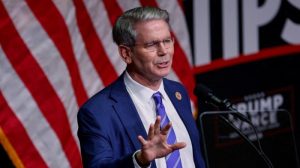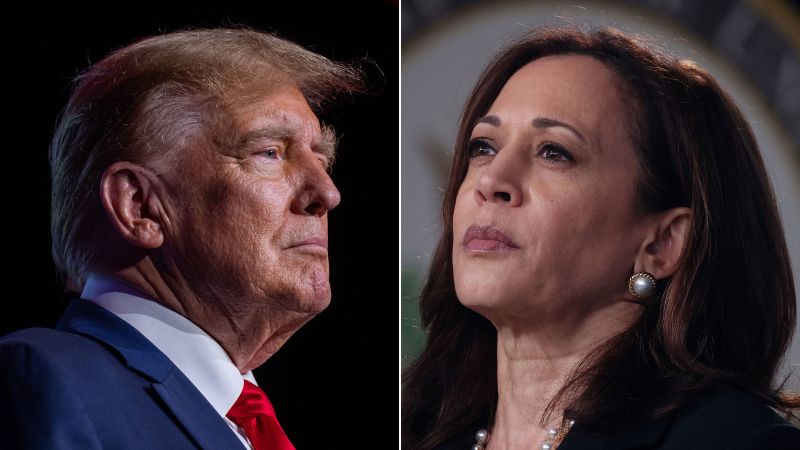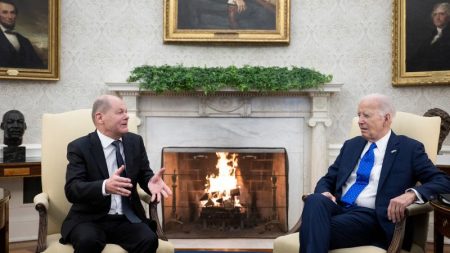Donald Trump’s campaign, which has whiffed in its early attacks on Kamala Harris’ new presidential campaign, will grapple this week for a more effective foothold after the vice president transformed an election of stunning surprises.
The ex-president has deployed some of his most trusted political tools — targeting racial identify, creating alternative realities, flinging insults and gaslighting. On Sunday, for instance, he spread a new false conspiracy theory over the size of Harris’ rally crowd in Michigan last week. But his efforts to bring down his new adversary and her policy of ignoring his provocations have so far more highlighted his own liabilities than hers and emphasized the way Harris could offer a new choice for voters.
When the ex-president called Harris “dumb” at a Montana rally Friday night or falsely claimed last month that she “happened to turn Black,” he may have delighted his base voters. But those kinds of comments risk alienating women and swing-state voters, as well as reversing the gains he has made among minorities that he’d proudly highlighted for months. Trump’s campaign was also forced on Saturday to deny a report in The New York Times that he’d privately referred to Harris as a “b*tch” as he bemoaned her momentum.
Trump’s undisciplined news conference last week and a weekend of venting also suggest that the Republican nominee is far from coming to terms with the shift in a race that seemed to be heading in his direction three weeks ago when bullish Republicans left their convention predicting a landslide.
But a swing-state tour by Harris and her new running mate, Minnesota Gov. Tim Walz, conjured euphoria not experienced by Democrats in years. It left Trump fuming that his victory in his debate with President Joe Biden only led to a new battle — one he’s more in danger of losing.
In three weeks, Harris has created a potential turning point — offering voters a burst of optimism after a dark period in modern history with her mantra that Americans “don’t want to go back” to the chaos and acrimony of Trump’s term.
Her approach is working — for now — in returning the race to a neck-and-neck contest. Polling averages show her reversing Biden’s deficits. A New York Times/Siena College survey released Saturday, for example, showed no clear leader in the vital swing states of Wisconsin, Michigan and Pennsylvania — a closer race than when Biden topped the ticket. The poll has no bearing on November’s result. But it encapsulated the swift shift in the campaign, and the Trump team felt obliged to release a memo claiming the surveys had “the clear intent and purpose of depressing support” for the former president.
The success of the new Democratic ticket in not just repelling Trump’s initial attacks, but also in using them to expose what Harris views as extremism, has created an unexpected problem for his team. Harris’ assumption of the Democratic torch and Biden’s withdrawal from the race three weeks ago have elevated her party to a place that would have appeared impossible a week ahead of its national convention in Chicago. But Trump is now up against a party that is energized, reversing one of his biggest advantages when Biden led the ticket. And freshness and hope are once again proving to be powerful political forces.
But campaigns are never static, and while Harris may benefit from a condensed run-up to November, there are still nearly three months to go. Trump remains a formidable political force and a vicious opponent. And having united his party behind him, especially in the wake of last month’s assassination attempt, he should still benefit from structural factors, including voters’ pessimism about the economy, that would normally be expected to help shape the election.
The former president is expected to zero in on this issue on Wednesday in North Carolina with a speech his campaign says will focus on how “hard-working Americans are suffering because of the Harris-Biden administration’s dangerously liberal policies” and prices that are “excruciatingly high.” Assuming he sticks to that script, his appearance — in a state Democrats are hoping to put back in play — will begin to test whether a focus on fundamental issues will counter the initial wave of enthusiasm for Harris’ candidacy. Trump has also announced that he will give an interview Monday evening to Elon Musk on the automotive and space pioneer’s X platform.
Trump is heavily criticizing the vice president for having avoided exposure to unscripted moments in news conferences or interviews. And she will face rising questions over when to provide more specificity on the policies she would adopt as president at home and abroad. Harris told reporters Saturday that she’d begin to lay out a policy framework on the economy this week. As a one-day stock market plunge showed last week, she is vulnerable to adverse economic news that could sway Americans who are feeling insecure.
The vice president seems conscious that a new stage of her nascent campaign is beckoning after last week’s tour de force with Walz. “What we know is, the stakes are so high. And we can take nothing for granted in this moment,” she said at a San Francisco fundraiser Sunday. “It’s really been a good couple weeks, but we have a lot of work to do.”
Trump sent his vice presidential nominee, Sen. JD Vance, onto Sunday talk shows to try to quell the Harris wave. The Ohio Republican painted the vice president and Walz as extreme liberals, staked out tough border policies, and accused Harris of complicity in Biden administration policies that left Americans hostage to high prices. He pressed the GOP attack on Walz that alleges, without decisive evidence, that he retired after nearly a quarter of a century in the Army National Guard to avoid deploying to Iraq. (CNN has reported that Walz filed to run for Congress in February 2005 — before his unit was notified it could deploy to Iraq.)
Vance suggested to CNN’s Dana Bash on “State of the Union” that his ticket was were running against an undefined opponent but one that bore even more responsibility for the policies of the last four years than Biden. “What’s different about it is that we’re running against a different person who a lot of Americans just don’t know,” Vance said. “I think we have to remind people that President Trump delivered lower prices, lower inflation, a prosperous and peaceful world, and also a secure border, and Kamala Harris’ policies have produced the exact opposite. Now, that was an easier case to make when Joe Biden was in there because people associate Joe Biden with the policies.”
Yet he was forced to answer for the ex-president’s often self-defeating comments. On “State of the Union,” for example, Vance wriggled to avoid contradicting Trump’s claim that Harris, the daughter of a Jamaican father and Indian mother, was not Black. “I believe that Kamala Harris is whatever she says she is,” Vance said. “But I believe, importantly, that President Trump is right that she’s a chameleon.” On CBS’ “Face the Nation,” Vance struggled to clarify an impression left by the ex-president last week that he might be open to restricting the sending of mifepristone, a widely used abortion drug, to patients through the mail.
The issue plays into Democratic efforts to make Trump pay a price for the overturning of the nationwide right to abortion by the Supreme Court majority that he built. And on ABC’s “This Week,” Vance found himself in the difficult position of being asked to condemn Trump’s 2022 hosting of White nationalist and Holocaust denier Nick Fuentes, who recently launched a racial attack on the Ohio senator’s wife, Usha. Vance described Fuentes as a “total loser” but said that the “one thing I like about Donald Trump … is that he actually will talk to anybody.”
The Trump campaign did secure a concession from the Harris campaign on Saturday over one aspect of Walz’s military record. A campaign spokesperson told CNN the Minnesota governor “misspoke” in a video from 2018 in which he said he handled assault weapons “in war.” But seeking to use Walz to expose Harris’ decision-making seems unlikely to make the critical difference for voters who must ultimately chose between Harris and Trump.
Therefore, a debate expected between Trump and Harris on ABC on September 10 looms as a pivotal new moment in the campaign. (Trump is insisting that their first showdown will in fact take place on Fox a week earlier, but Harris has so far agreed to only a single debate.)
Earlier in her vice presidency, Harris stumbled several times in interviews and interactions with the press. And Trump’s team has been trying to goad her into more unscripted moments. While she appears to have evolved as a political performer, there’s no reason for her aides to expose her to risks when her campaign is soaring, especially ahead of next week’s Chicago convention, when party image-makers will have a near media monopoly as they seek to introduce her to undecided voters during prime time.
But Harris will not be able to avoid deeper scrutiny for much longer — and nor should she, considering she’s running for president. She told reporters recently she was looking at doing a major interview by the end of the month.
Her stump speech is aspirational and in line with Democratic orthodoxy, but she speaks in broad strokes. Since becoming the nominee, she’s offered no insight into her thinking on a fractious world full of rising threats to US power from adversaries like Russia and China. Her campaign has used the time instead to try to tackle political pitfalls, such as by releasing an ad branding her as tough on border issues and positioning Trump as a blockage against effectively curtailing undocumented migration.
Given Trump’s unpopularity, simply being a younger and more optimistic antidote to a dystopian national vision could be enough for Harris to win the election. But until she performs strongly in an uncontrolled public situation, questions about her political dexterity will hang over her prospects — especially since her 2020 primary campaign quickly faded as her political liabilities became more obvious.
But as Trump has shown in recent days, he still hasn’t worked out a way to respond to the suddenly changed circumstances of the campaign.
Read the full article here













